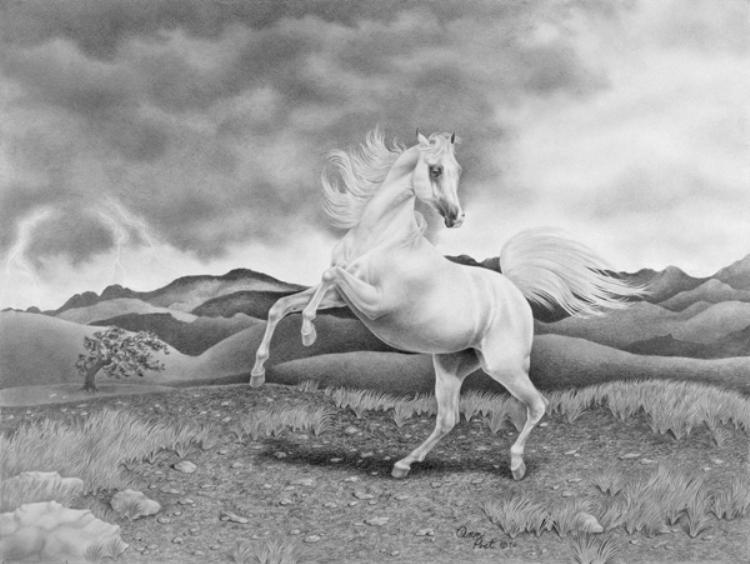Horses have always been an integral part of my life. From being a horse crazy child, and being a horse artist, to raising and training horses professionally, my life has been intertwined with their beauty, and their raw, wild energy.
Thinking back to when I was a teenager, and first came out of that house of horrors, I saw clearly how crushed and broken my life was, and how unprepared I was to survive in this world. Only Jesus could have healed me from the devastating effects of trauma, the PTSD, recurring nightmares, and ingrained victim mentality that I struggled with. As I looked at where I was then and where I’m at now, I saw how much I had grown, how much I had overcome in my life, and the role horses had played in my healing journey.
One of the things that stood out to me was a type of equine therapy I unknowingly put myself in. I purchased my first horse at age seventeen with money I had earned from working. It was the first independent thing I had ever done in my life. Although I did it with rebellion in my heart, and a fierce determination to move forward in spite of my abusers, it turned out to be a healthy choice for me. I am forever grateful to these horses for what they taught me.
One of the horses I bought in my teenage years was a mare named Nina Alegra, which translates into Swift Child in English. She was a racehorse, just off the track, and had been badly abused by brutish and cruel handlers. She was terrified of people. Before I purchased her the owners were having a difficult time selling her, because when anyone tried to ride her, she would immediately panic, rear up, and throw herself over backwards. Needless to say, this was a dangerous prospect for anyone.
In order to gain her trust and work with her I had to be extra gentle, speaking soothingly to her all the time. I was acutely aware of her skittish condition and handled her with compassionate tenderness, and genuine love. My method worked, and I became the only one who could ride her without incident. I then purchased her and began to work with her daily. She responded well to my training, and became a wonderful riding horse and jumper, but only for people who treated her right. One thing that I hadn’t been aware of was how my working with her was helping me. By fostering an abused horse who was afraid of people, I was learning to care for myself.
Below is an excerpt about Nina and other horses, from my book, Child of Sorrow, Child of Joy:
Riding her through the dry riverbeds and across winding deer trails in the desert were among the happiest days of my life. It was here I felt as if I was a part of God’s creation, and not just some misfit.
The times that I spent working with horses put me in situations where I was dealing with sensitive animals, occasionally those who had been abused, and I had to nurture them. It was like caring for an abused child, which taught me how to nurture myself. I gained a sense of achievement from training horses, and seeing how well they responded. As a child, I had no sense of accomplishment, because the words of my mother… always negated anything I did. When the horses responded, there were no condemning words or mocking to negate my success. Horses helped me grow in confidence and understanding of how nature was balanced, even if my family was not. With every victory, I felt like a child who finally hit the ball in a baseball game. For the first time in my life, I was gaining a sense of self-worth, fragile though it was.
Horses are naturally prey animals, that is, they are hunted by lions, wolves, and other predators. Anyone who was abused was treated as though they were prey to their abusers, whether intentionally or not. Because of this connection of vulnerability, horses are excellent partners in therapy. They help people with low self-esteem, because their response is immediate and honest, unlike many humans. Horses only know how to respond with genuineness. There are no ulterior motives, no manipulation, no deception, and no betrayal. This goes a long way in helping those who have experienced many of these negative traits in people.
Any victim can tell you of the characteristics of an abuser, the intimidation, deceiving double-crossing, baiting and treachery. What they often cannot comprehend are the aspects of healthy relationships, such as being treated with respect, honesty, dignity, gentleness, etc. Sometimes working with horses will be the first time a victim of abuse encounters these characteristics.
Job 12:7 “But ask the beasts, and they will teach you; the birds of the heavens, and they will tell you”

